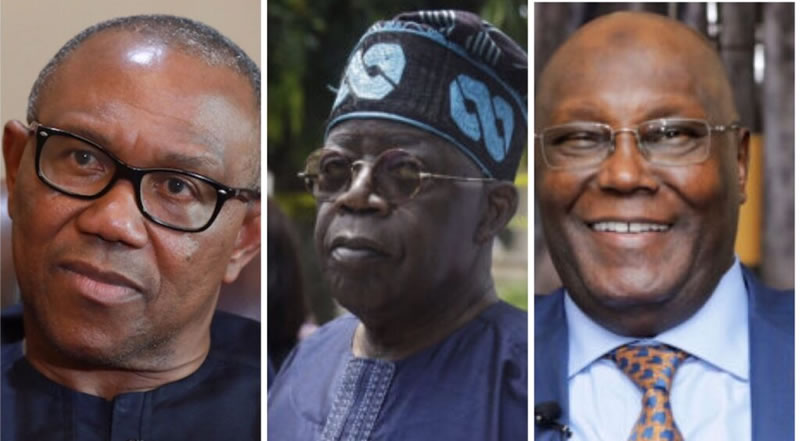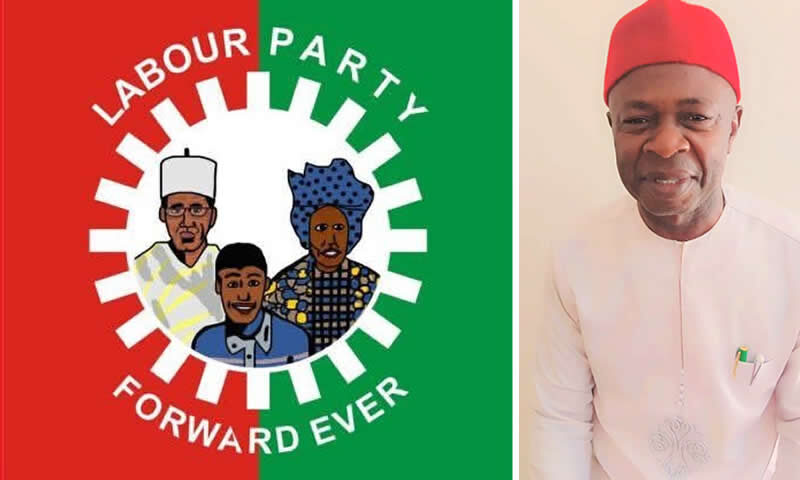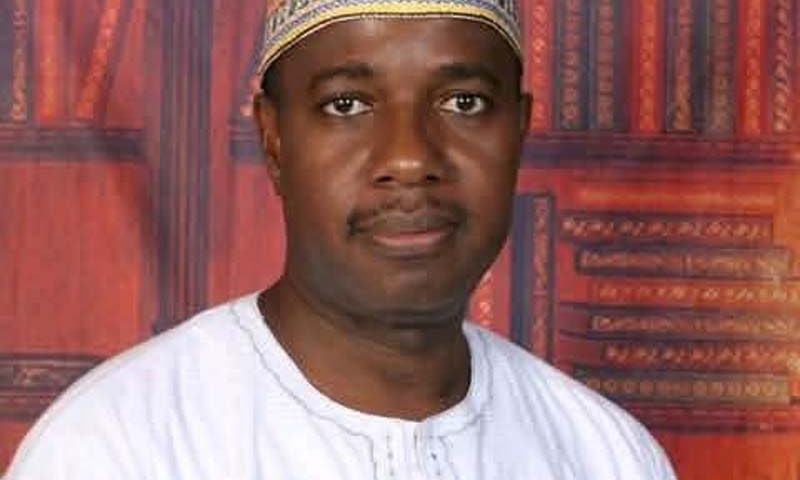“Business experience is not lacking among the top candidates for president in Nigeria’s February 2023 elections. We look at how these contenders plan to confront the country’s economic challenges.”
Business experience is not lacking among the top candidates for president in Nigeria’s February 2023 elections. We look at how these contenders plan to confront the country’s economic challenges.
The economy played a significant role in Kenya’s August 2022 election, and Nigeria’s 2023 polls are set to follow the same pattern. For the first time in a long time in Nigeria, all of the top candidates – the People’s Democratic Party (PDP)’s Atiku Abubakar, the All-Progressives Congress (APC) Bola Tinubu and the Labour Party’s Peter Obi – have years of experience in the business world.
But who has the policies to win over the business community, get votes from those seeking work and gain the confidence of investors?
Helping to grow the economy out of a recession and high inflation will be a big challenge. Recently, Nigeria has been experiencing a steep economic decline. In September, the Organisation of the Petroleum Exporting Countries announced that Angola and Libya had surpassed Nigeria, which for decades had held the undisputed title as Africa’s largest oil producer.
While Nigeria remains one of Africa’s largest economies, it also holds the unenviable position as the world poverty capital, with a youth unemployment rate of 33.3%. Under President Muhammadu Buhari, Nigeria has experienced two recessions, both of which were triggered by a sharp drop in oil prices.
Issues including the economy and security are already high on the public agenda ahead of the 2023 polls. Nigeria’s economy will take a different turn regardless of who wins the election among the three top contenders.
Tinubu, Abubakar and Obi have a few things in common. They all say they support private-sector investments and want the government to focus mainly on creating a business-enabling environment.
They all believe in more resource control for Nigeria’s states and a less powerful federal government. However, they differ in how to get things done.
Peter Obi
A former governor of Anambra State in south-east Nigeria, Obi was an accomplished businessman before going into politics in 2002. He was chairman of Nigeria’s Fidelity Bank, a second-tier commercial bank. Other companies he has been involved with include Next International Nigeria, one of Nigeria’s largest department stores; Chams Nigeria, Paymaster Nigeria, and Guardian Express Mortgage Bank, where he served as chairman.
The focal point of Obi’s economic policy is ‘prudence’, something he claims to epitomise. He recalls that as governor and even now, he flies strictly economy and travels light, with only a handful of aides. He stays in inexpensive hotels and wears inexpensive clothes. And, unlike other governors, he refused to sign a law that would guarantee himself a lifetime pension.
“I have said it to Nigerians, Peter Obi wears only black shoes, and I have two pairs of them, and I travel with them. The purpose of shoes is to protect the leg from being hurt. Nothing else! I bought this from Marks & Spencer, $49.99, finish,” he said at a town hall meeting.
Obi argues that Nigeria has more of a spending problem than a revenue problem. He says he dislikes borrowing for consumption and is more inclined towards promoting a culture of savings, just as he did while he was Anambra State governor. “It has become imperative to restrict federal borrowings to the statutory 5% of the previous year’s revenue,” he said in a tweet in August.
The Labour Party candidate thinks that China is a good economic model for Nigeria. He is constantly comparing the two countries, which has earned him the nickname ‘Obi China’ from his opponents.
“While Nigeria’s GDP and that of China was around $11 billion three decades ago, today, China has been able to grow its own to over $3 trillion, while that of Nigeria still stands at $300 billion. China was able to achieve this because it embarked on aggressive saving, diversified its economy into a knowledge-based export and invested in education,” he told the media. “There must be aggressive savings. That is the only way our economy can survive as a nation. $150 million was saved [by the time] I left the office.”
He also conditionally supports the removal of the petrol subsidy. “Yes, I will remove the fuel subsidy,” he says, “but I have to offer an equivalence that will benefit the citizens. But if that is not achievable, I will not remove it.”
Atiku Abubakar
The former vice president is also a veteran businessman. After retiring from Nigeria’s Customs Service in the 1980s, Abubakar went into business and politics. Some companies he has interests in include: Prodeco International Limited, ABTI schools and Intels Nigeria Limited, a logistics company.
Unlike Obi, Abubakar does not really place much emphasis on frugality, even though he says recurrent expenditures should not exceed 45% of the country’s budget. Rather, his ideology is liberal capitalism.
He says the privatisation of the government’s businesses and assets remain the thrust of his economic policy. He also supported this approach when he headed a national council on privatisation as vice president in 1999.
The PDP’s candidate argues that government should focus strictly on regulation and leave the business to the private sector. In his policy document, which he presented in September, he said he would resuscitate Nigeria’s ailing economy by launching a $10 billion economic stimulus fund within his first 100 days in office. This fund would support strategic micro, small and medium-scale enterprises.
Doubling the GDP
The former vice president says he will seek to double Nigeria’s GDP within seven years through a “warm handshake” with the private sector. “We shall incentivise, with regulation and tax incentives, a consortium of private-sector institutions to establish an infrastructure debt fund with an initial carrying capacity of $20 billion.
“This will be for the financing and delivery of large infrastructure projects across all sectors of the economy,” he said. He promises to push for a foreign-exchange policy that encourages capital inflows and makes capital outflows less attractive for foreign investors.
The PDP candidate also promised a review of the country’s constitution to take electricity away from the exclusive powers of the central government. He says this could help address the country’s weak power supply and boost investments and production.
“Over the medium term, I will propose legislation for the removal of the entire electricity value chain from the exclusive list and give states the power to generate, transmit and distribute electricity for themselves,” Abubakar said. He also promises to stop all financial support to ailing public enterprises and would rather privatise Nigeria’s dilapidated refineries than spend $1.6 billion on their revitalisation.
Bola Tinibu
The former governor of Lagos State – Nigeria’s commercial capital – is also a businessman. He has been active in several businesses including media, oil and gas, hospitality, transportation, real estate and construction. He worked at Mobil, Arthur Andersen and Deloitte as an accountant before entering politics in 1992.
The self-styled Lagos godfather, who initiated an economic blueprint that helped Lagos grow its revenue base exponentially, says such a blueprint could set Nigeria on the path of economic recovery. “When I became governor of the state, Lagos was generating internally N600 million ($1.42 million) monthly, but as of today, Lagos is proud of generating N50 billion monthly. These are all the things I put in place to make Lagos great,” he told the media.
Tinubu, the ruling APC’s candidate, supports an economic model that involves public-private partnerships and concessions. Tinubu says his administration would focus on fiscal issues and stricter tax enforcement. New taxes could be introduced and stiffer penalties put in place for defaulters. He has been pushing agriculture in recent times and has been meeting with farmers with a view to ensuring an increase in the production of cash crops for exports.
A leaked draft of his economic blueprint states that he will seek the introduction of a commodity exchange and futures markets. These can help farmers sell their produce in bulk ahead of time and cut post-harvest losses, which are very common in Nigeria’s agrarian communities.
Tinubu also promises total deregulation of the oil market, which will include the removal of the petrol subsidy and building more national storage to sustain supply.
Additionally, he seeks the establishment of six regional economic development agencies that would seek to harness the potential of each geopolitical zone. Tinubu says he will target 15,000MW of electricity and 12% GDP growth within four years.
What the experts say
Business experts have clear ideas about what the Nigerian economy needs. Anthony Kila, a professor of strategy and development at CIAPS in London, says the calibre of economic debate will be higher than before. “[The candidates’] personal history shows that they will be favourable to the private sector and production,” he says, adding: “These candidates are more exposed, more experienced. This is like the pre-independence election when all the best were involved in the electoral process. This is a battle of the elite.”
He argues that candidates should focus on raising production. “We need to shift from a finance economy to production. Because, as it is, banks are making profits, fintech is growing, crypto is growing, but the real economy is not growing,” he says.
But Adeola Adenikinju, head of the economics department at the University of Ibadan, says the primary focus should be a constitutional amendment that would give more powers to the states to make them financially viable. While it is important to reduce the cost of governance, enhancing the country’s revenue base is more critical because Nigeria’s revenue to GDP ratio is one of the lowest in the world, he says: “Nigeria has a lot of structural issues and once the foundation is faulty, anything you try to build on it will not stand.”
Adegbemi Onakoya of the economics department at Babcock University says plans for devolution are commendable, but tackling insecurity is paramount because, without security, investors will not invest. “When security is bad, the economy is affected,” he says.






